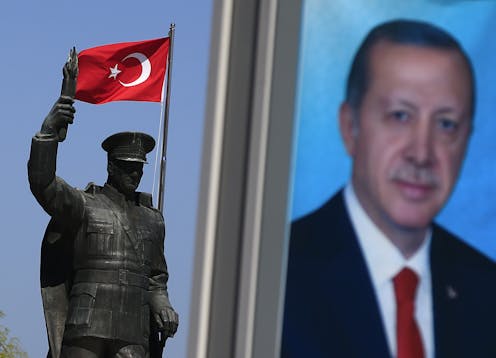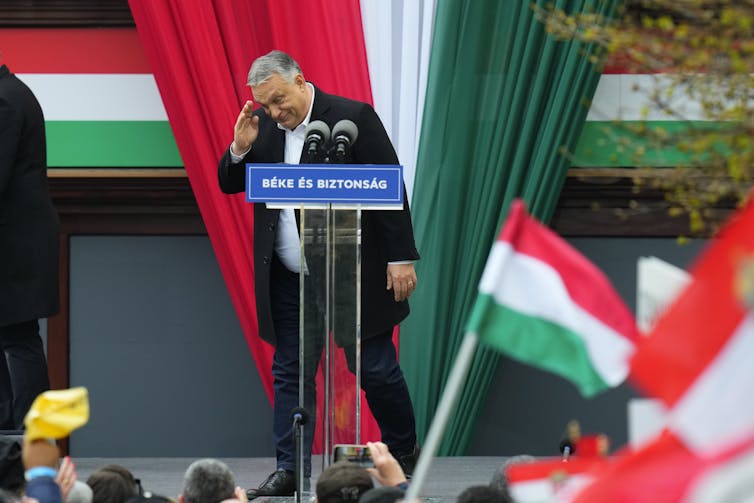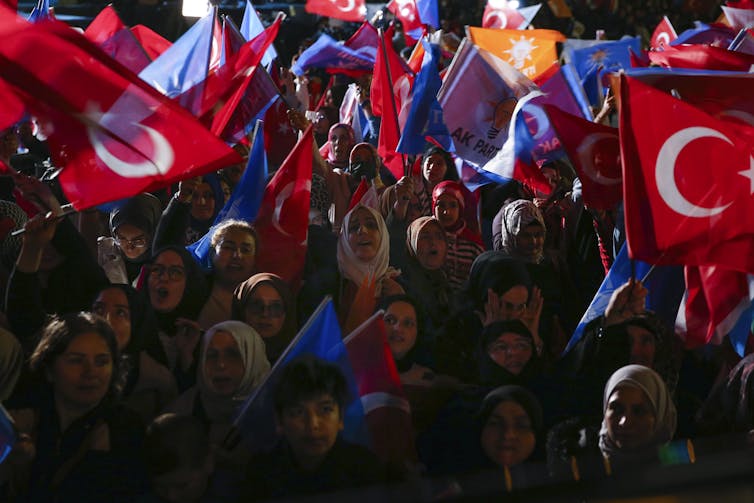
Democracy is decreasing globally – and has been doing so for the last 17 years, according to 2023 findings published by the nonprofit group Freedom House, which advocates for democracy.
These leaders’ generous public spending on key constituencies and effective promotion of nationalism are two reasons why they remain popular.
I am a political scientist who studies political and economic dynamics in low- and middle-income countries. This phenomenon of societies becoming less democratic after having made progress toward full democracy is known as democratic backsliding.
In my 2022 co-authored research, my colleague, Byunghwan Son, and I identified two key ways that democratic backsliding happens.
First, political leaders weaken democracies when they adopt legal and policy measures that make the executive branch stronger and the other branches of government – such as the judiciary and legislative branches – weaker. This then reduces checks and balances on the executive branch.
Democracy also is weakened when leaders make it difficult for opposition parties to compete in elections. This curtails the citizens’ choice to support candidates who are not the de facto leader, whether it becomes harder to learn about these candidates in the media or because it is dangerous to publicly support their causes.
Political leaders in a range of countries, including China and Nicaragua, are increasingly taking steps to consolidate their power by undermining other branches of government and the opposition. When leaders do so, they are displaying authoritarian tendencies, meaning they try to create a government with a very strong executive branch and little tolerance for dissent.
But despite these trends, some leaders who have gained authoritarian reputations among critics – like Recep Tayyip Erdoğan, president of Turkey, and Viktor Orbán, prime minister of Hungary – enjoy high approval ratings within their countries.
Why do leaders who diminish democracy have such strong public support?
These leaders’ generous public spending on key constituencies and effective promotion of nationalism are two reasons.
Erdoğan’s endurance
Erdoğan has been in power for almost 20 years. He first served as prime minister of Turkey in 2003 and then became president in 2014. He was reelected president for another five-year term in May 2023.
Opposition parties are able to compete in Turkish elections, but Erdoğan has taken other legal measures over the years to diminish contenders’ chances among voters.
Since Erdoğan’s AKP political party came to power in 2002, he has appointed sympathetic judges. This has also enabled him to remove or jail prosecutors and judges and replace them with loyalists.
Ekrem İmamoğlu, the former mayor of Istanbul and a member of the CHP opposition party, was considered a formidable challenger to Erdoğan before the 2023 election. But in December 2022, a Turkish court sentenced İmamoğlu to nearly three years in jail for calling Turkey’s supreme election council “fools,” and barred him from politics.
Erdoğan’s control of the judiciary system helped remove the threat of İmamoğlu’s popularity. Around 2021, Erdoğan himself was experiencing a dip in popularity.
Erdoğan has taken other steps to consolidate his power. This includes detaining military officials who question his authority, and arresting journalists, activists and academics who criticize him.
Despite these actions, people reelected Erdoğan – and his approval rating continues to be relatively high, even in the face of a weak economy and high inflation.
Public spending is one key way Erdoğan has maintained people’s support.
Leading up to the May 2023 elections, Erdoğan went on a spending spree to help consolidate his support. He repeatedly increased the minimum wage, most recently by 34%. He dropped the retirement age requirement, giving 2 million people the opportunity to stop working and receive pensions.
Erdoğan, who has long championed Islamic causes and groups in a secular country, has also rallied conservative constituents by positioning himself as a leader who will fight for religious rights.

Orbán’s hold on Hungary
Similar trends are underway in Hungary. Orbán has served consecutive terms as prime minister since 2010. He won his fourth election in 2022.
Since 2010, Orbán has taken measures to strengthen his power. In 2013, he used his party’s majority in parliament to make constitutional amendments that limit courts’ power. One change involved eliminating all decisions courts made before 2012, discarding a body of law from before Orbán’s time.
More recently in 2018, Orbán tried creating a parallel court system that would have let a justice minister oversee election-related cases in a separate court system.
However, pressure from the European Union – of which Hungary is a member – stopped these planned reforms in 2019.
Orbán has also tried to consolidate his power by weakening independent media. This effort includes not renewing news organizations’ broadcast rights and government purchase of media outlets. This, in turn, makes it difficult for opposition candidates to get their message out to voters. In some cases, print news outlets have not allowed opposition candidates to place political advertisements, for example.
Despite these developments, Orbán’s approval ratings remain high, hovering around 57% following the 2022 parliamentary election.
Here again, a political leader used high levels of public spending, as well as a nationalist message, to his advantage.
Orbán provided generous benefits to families, children and armed forces before the 2022 elections. Some of these measures he announced included tax rebates to families with children, additional pay to members of armed forces and canceling personal income tax for workers under the age of 25.
Orbán used nationalism – expressed through anti-immigrant rhetoric – as a strategy to garner support during elections, as well. He has discussed the drawbacks of “race mixing” and migration in order to drum up support among Hungarians who are concerned about the influx of newcomers.

Authoritarianism a broader trend
Erdoğan’s and Orbán’s attempts to consolidate power are only two examples of a broader, rising trend of authoritarianism across the world.
A total of 60 countries – including Nicaragua, Tunisia and Myanmar – experienced declines in freedom in 2022, while only 25 improved, according to Freedom House. The U.S. received a score of 83, or “free,” according to this list, which considers political rights and civil liberties and scores countries based on these factors.
Using money to give incentives to voters and invoking nationalism are two ways leaders like Erdoğan and Orbán maintain support. But other factors, like rising inequality, may also play a role in why people turn to strongmen leaders for answers.
Nisha Bellinger receives funding from Social Science Research Council (SSRC).
This article was originally published on The Conversation. Read the original article.







